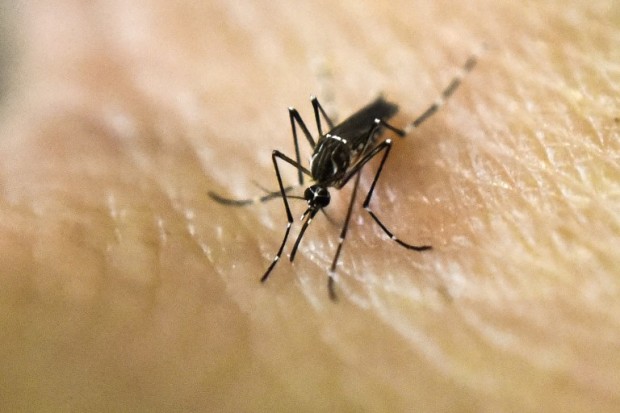
This file photo taken on January 25, 2016 shows an Aedes Aegypti mosquito photographed on human skin in a lab of the International Training and Medical Research Training Center (CIDEIM) in Cali, Colombia. AFP FILE PHOTO
The Department of Health (DOH) suspended on Friday its dengue vaccination program following new analysis disclosed by the manufacturer of the country’s first dengue vaccine that it might be harmful if administered to individuals not previously infected with dengue virus.
Health Secretary Francisco Duque III said review and consultation is ongoing with experts, key stakeholders, and the World Health Organization (WHO).
“The DOH is highly committed in strengthening and intensifying its ongoing surveillance and monitoring to evaluate the program and ensure safety,” Duque said in a press briefing.
On November 29, 2017, the DOH received a preliminary briefing on updated information regarding dengue vaccine, Dengvaxia, from Sanofi Pasteur. Based on the report, the dengue vaccine has shown consistent and sustained benefit for those who were previously infected with the dengue virus.
The report also indicated that for those who were not previously infected by the dengue virus, the analysis found that vaccination led to a benefit in preventing severe illness for at least 30 months. In the longer term, however, severe cases may occur following a subsequent dengue infection among those who were not previously infected.
An average of 200,000 cases of dengue is reported every year. Vaccination is essential to the integrated approach in dengue prevention and control.
Currently, Duque said, there is no reported case of severe dengue infection among those who received the vaccine.
“The DOH assures the public that it is serious in carrying out its mandate to always guard the health and well-being of its constituents. Thus, it shall ensure that vaccines are always safe and effective to optimize its health benefits,” Duque added.
Dengue fever and dengue hemorrhagic fever are acute viral infections that affect infants, young children, and adults. It is transmitted by a bite of an Aedes aegypti mosquito infected with any one of the four dengue serotypes: Den-1, Den-2, Den-3 and Den-4.
In 2016, the DOH launched the dengue vaccination initiative in three highly endemic regions (Regions III, IV-A and NCR) with over 700,000 individuals receiving at least one dose of the vaccine. This immunization program is in line with the recommendation of the WHO for mass vaccination in highly endemic countries. /kga